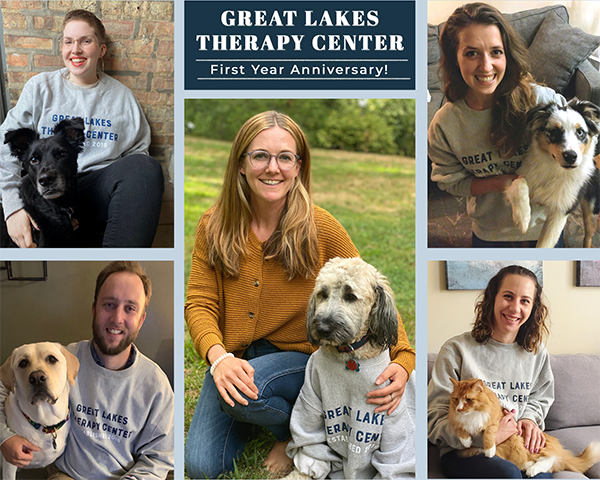Great Lakes Therapy Center Blog

The Connection Conundrum: A Middle Path to Caring for Loved Ones
How do we stay connected to our teens when the waters of adolescence feel stormy and unpredictable? In this blog, Christine Nolan explores how dialectical thinking and DBT skills like Walking the Middle Path can help parents hold space for love, change, and connection—all at once.


The Boat People: Keeping the Boat Steady in the Turbulent Waters of Parenting
In our latest post, Christine Nolan draws inspiration from Thich Nhat Hanh’s powerful metaphor of a calm person on a stormy boat to illustrate the impact of co-regulation in parenting.
When we steady ourselves—through DBT skills like validation, compassion, and acceptance—we offer our children an anchor in moments of emotional chaos. With practice, we can be that calming presence in their storm.


Radical Acceptance in Parenting and Caring for Loved Ones
“Fear is you believing that you are in the director’s chair. The reality is that you are not.” In our latest blog, therapist Christine Nolan reflects on the challenge of letting go of control—especially as a parent.
Through the DBT skill of Radical Acceptance, she explores how loosening our grip can reduce suffering, deepen connection, and bring greater peace to our relationships. Acceptance doesn’t mean giving up—it means showing up with compassion, presence, and trust in what is.


Observing Limits: It’s a Struggle… Let’s Talk Skills!
Setting limits with someone you love who is struggling can feel impossible. It’s common to feel guilt, fear, or confusion—especially when your loved one relies heavily on you for support. In this blog, we explore the concept of observing limits through a DBT lens, and how boundaries, rather than being cold or dismissive, can actually foster deeper compassion and connection. Learn how to recognize your internal signals, stay aligned with your values, and communicate boundaries effectively using practical skills like DEAR MAN, radical acceptance, and mindfulness. This is not just about changing a relationship—it’s about caring for yourself with intention.

Joy, Suffering + Dialectics
“You are the first person to give me permission to experience joy.” These words, shared by a mother in a training, still echo for Christine Nolan, author of our latest blog post —and maybe for you too. When we’re caring for others, joy can feel out of reach. But in DBT, we learn that joy and suffering can coexist. In this blog, we explore how embracing dialectics, mindfulness, and compassion can help us make space for joy—right alongside the pain.

Mindfulness Drop-In
Welcome to our virtual mindful haven at Great Lakes Therapy Center, led by compassionate therapists devoted to guiding individuals on a journey of self-discovery, mental clarity, and emotional well-being through deepening their own mindfulness and meditation practice.

Program Certification Spotlight
Victoria Kessinger, LCPC, created GLTC’s DBT Program in 2019 because she became aware that Illinois lacked affordable Full Protocol DBT services. While there were several DBT providers in the area, many of them provided DBT informed services and the few that provided Full Protocol DBT did not accept insurance. GLTC was created to fill that gap.

DBT Basics for Friends & Family Group
Great Lakes Therapy Center New Group Offering: DBT Basics for Friends and Family Group


Hey Parents, how about dispensing some validation today?
What is so magical about a simple validation? Humans need connection. Validation fills that need, the need to be seen, heard, understood and appreciated.

The Connection Conundrum
As a parent, you may have a viewpoint that is true for you, while your teen has thier own story and perspective. The goal is to find the middle ground of effective behavior, solve the problem, and ultimately to stay connected to our teen.

Turning One in Covid-Land
I couldn't have imagined what the first year in business would hold as I opened Great Lakes Therapy Center last summer. A pandemic where woking meant seeing clients via telehealth, wearing masks in public, and not hugging those close to me was certainly not on my radar…

Continuing Education to Best Serve Our LGBTQIA Community
I couldn't have imagined what the first year in business would hold as I opened Great Lakes Therapy Center last summer. A pandemic where woking meant seeing clients via telehealth, wearing masks in public, and not hugging those close to me was certainly not on my radar…

Covid-19 Resources
I couldn't have imagined what the first year in business would hold as I opened Great Lakes Therapy Center last summer. A pandemic where woking meant seeing clients via telehealth, wearing masks in public, and not hugging those close to me was certainly not on my radar…

Black Lives Matter: Our Thoughts and Resources
In the wake of the murder of George Floyd and subsequent protests, all of us at Great Lakes Therapy Center want to make it clear that we stand with the Black Lives Matter Movement. We support the people protesting across the world and we commit to examining and changing the ways we have benefited from and unintentionally have contributed to systemic racism.

Emotional Regulation and Trauma Therapy
I became trained as a Certified Clinical Trauma Professional through the International Association of Trauma Professionals so that I could be better equipped to assist my clients in the healing process. For people coming to Great Lakes Therapy Center with the goal of processing past trauma, treatment may look different than they were expecting. After completing the intake process, therapy will not necessarily look like the typical talk therapy format. There are reasons for the variation in session structure when processing past trauma.

The Dialect of Anger
When I talk about anger, I like to start by asking a simple question: “Is it alright to be angry?”
I get many responses to this question, but most of them amount to saying the same thing: “No.” This response never surprises me. After all, who wants to be angry? Just the word anger is enough to conjure up bad memories of when we said or did something that prompts feeling guilt or shame. On top of that, we are constantly receiving messages from our environment that anger is “bad” through movies, television and social media. Anger acted on ineffectively can lead to damaging emotional consequences that we cannot forget. When we become emotionally dysregulated, anger often leads to harm in our relationships.

